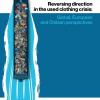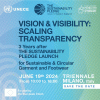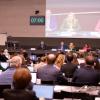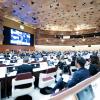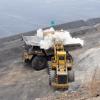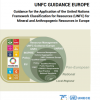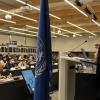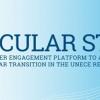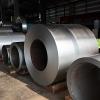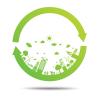Circular Economy Press Releases
Displaying Results 1 - 25 of 64
After a year-long deferral, the Parties to the Convention on Environmental Impact Assessment (the Espoo Convention) and its Protocol on Strategic Environmental Assessment (the Protocol on SEA) have again met at the resumed sessions of the Meetings of the Parties to the Espoo Convention and the
With demand for minerals critical to renewable energy technologies expected to almost triple by 2030, global and regional leaders gathered at the EU Raw Materials Week 2024 to address the critical challenge governing mineral resources essential for the energy transition. In a key session, UN
The rise of fast-fashion, marked by rapid turnover of collections, has led to a sevenfold increase in the global trade of used clothing in the last 4 decades. With more than 80% of all purchased clothing items globally (62% in the EU) being disposed of as general garbage, which is incinerated or
Three years ago, the European Union and UN Member States challenged UNECE to demonstrate that traceability and transparency were possible in the clothing and footwear sector. Today, after more than 20 project pilot projects, and 110 pledges from leading brands, manufacturers, non-governmental
Moving to a more circular economy is increasingly recognized as vital to sustainable development, decarbonization, resource efficiency and competitiveness. More and more countries are adopting national policies that are directly or indirectly related to the sustainable management of natural
Multilateral Environmental Agreements (MEAs) will be at the forefront of discussions at the sixth session of the United Nations Environment Assembly (UNEA-6) on how to tackle the triple planetary crisis.
Executive Secretary Tatiana Molcean will lead a UNECE delegation to UNEA-6, the world’s
Gathering in Geneva for the Meetings of the Parties to the UNECE Convention on Environmental Impact Assessment in a Transboundary Context (Espoo Convention) and the Protocol on Strategic Environmental Assessment (SEA), Ministers and high-level government officials emphasized the crucial importance
Micro, small and medium-sized enterprises (MSMEs) account for over 90 per cent of registered enterprises in the UNECE region, spreading from North America to Central Asia. These enterprises hold immense potential to drive the transition towards a circular and green economy due to their agility and
A milestone for advancing sustainable resource management worldwide has been reached with the endorsement of the United Nations Resource Management System (UNRMS) by the United Nations Economic and Social Council (ECOSOC). UNRMS is a set of principles and requirements that guide the planning,
In the 75 years of its existence UNECE has proved to be an effective platform for cooperation among countries in the pan-European region and beyond, facilitating economic development and integration. Yet, due to ongoing multiple crises, the region is further away from achieving the 2030 Agenda for
Global biodiversity is now declining faster than at any time in human history. As leaders gather for the 15th Conference of Parties to the Convention on Biological Diversity (COP-15, 7-19 December), UNECE calls for the region to urgently step up with the leadership needed to stop biodiversity loss
中华人民共和国自然资源部与联合国欧洲经济委员会长期合作,旨在推进全球固体矿产和油气资源分类的协同发展和互联互通。
联合国资源分类框架(UNFC),是一个广泛采纳、普适于能源与所有矿产资源可持续管理的国际标准,可有助于国家或区域建立统一治理机制,监管一次和二次原材料资源的保有数量。自1997年以来,中国专家积极参与联合国资源分类框架的研制,并作为1999版中国固体矿产资源储量分类标准的重要参考之一。
2018年,中华人民共和国自然资源部和联合国欧洲经济委员会联合研制了中国固体矿产和油气资源储量分类标准与联合国资源分类框架对接文件。2021年,
Guidance for the Application of the United Nations Framework Classification (UNFC) for Mineral and Anthropogenic Resources in Europe (UNFC Guidance Europe) was approved by international experts meeting in Geneva and online for the 13th session of the Expert Group on Resource Management. The
Without scaled-up efforts to finance and sustainably manage the Critical Raw Materials needed for a rapid renewables and clean energy shift, countries of the pan-European region and North America will face huge challenges to deliver on the Paris Agreement and Sustainable Development Goals, the
Countries have taken a step to translate rising commitment for sustainable urban development into concrete changes to the fabric of our cities with the adoption of a UN-backed Declaration.
Today, governments attending the 83rd session of the UNECE Committee on Urban Development,
“It is a responsibility to happen to be alive at this very moment, when scientists are telling us that we are facing an existential threat. Every person, every business, every government – especially those with the privilege of choice and power – needs to play a part in the transformation towards
Almost all countries in the UNECE region, covering US, Canada, Eastern and Western Europe, the Balkans, the Caucasus, and Central Asia, have adopted national policies which are directly or indirectly related to the sustainable management of natural resources and the circular economy.
Multiple
UNECE and the Union of European Football Associations (UEFA) have signed a Memorandum of Understanding with the aim of showing how football and hosting UEFA events can support cities to become more sustainable.
To celebrate the agreement, a side event entitled ‘Football as accelerator of change’
The United Nations Economic Commission for Europe (UNECE) welcomes comments to support the implementation of a universally applicable scheme for the sustainable management of all energy and mineral resources.
Draft Guidance for the Application of the United Nations Framework
UNECE is launching an expanded version of the Portal on Standards for SDGs, which allows users to identify standards which can contribute to the realization of individual Sustainable Development Goals (SDGs). The Portal has been updated from 1,600 standards mapped across five SDGs to 20,000
The Conference of European Statisticians Framework on Waste Statistics, published today by UNECE, provides a new perspective on defining and measuring the waste products of our economies.
Every household, enterprise and institution produces waste.
If not properly dealt with, this waste can pose a
UNECE and FAO are implementing blockchain tracing technology in cotton supply chains in Latin America. Demand is increasing from consumers for more traceability of their products to the origin and for more transparent sustainability credentials. Yet in
Governments, businesses and individuals around the world are increasingly recognizing that the way our economies function cannot be sustained if we are to stem the tide of climate change, resource depletion and biodiversity loss and reduce our negative impacts on the environment. A more
The impacts of climate change on forests will be profound. Yet global emissions reduction models rely on the ability for forests to both sequester carbon and scale up production of innovative new products that can replace emissions-intensive materials used in construction, textiles and energy
SPECA countries have experienced the effects of climate change and the COVID-19 pandemic on key aspects of economic development and cooperation, with negative consequences for sustainable development. COVID-19 related restrictions and border closures caused serious disruption to supply chains and


